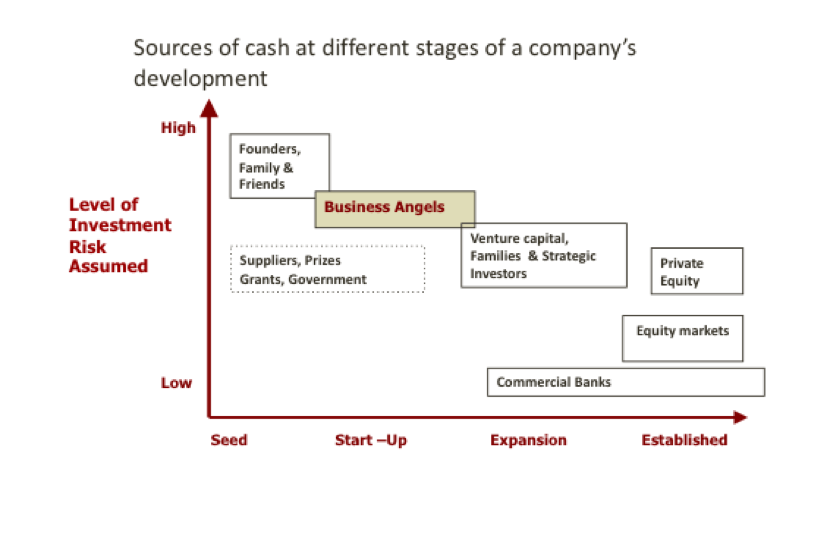 You may not be familiar with the term ‘angel investing,’ so here’s a quick definition: an angel investor – also known simply as angel, or business angel, informal investor, angel funder, private investor, or seed investor – is an individual who has two wings, one for investing and another for support.
You may not be familiar with the term ‘angel investing,’ so here’s a quick definition: an angel investor – also known simply as angel, or business angel, informal investor, angel funder, private investor, or seed investor – is an individual who has two wings, one for investing and another for support.
Angel Investors provide the capital and support for an innovative business startup in exchange for convertible debt or ownership equity. Angels are typically high-net-worth individuals who invest directly in early-stage businesses and then take an active role in mentoring the management team. They tend to invest earlier in the life cycle of an emerging business and base their investment decision upon the business idea and the qualification of the management team. Successful angels also actively mentor the companies in which they invest in.
The below graph shows the important place business angels play in the financing life cycle of a company.
Angel Investors are a startup’s best-friends
Early stage startup funding is generally considered the riskiest but potentially has a large return on investment; it is somehow critical to any strong startup ecosystem. Recently, Banque du Liban Circular 331 ‘unleashed’ more than $400M of equity financing to the science, technology, engineering, and mathematics (STEM) sectors through local banks. However, seeing how banks and both the existing and new Venture Capital funds are responding to Circular 331 over the past 18 months, the major concentration is on large investments tickets – average $1M-2M, and geared towards growth and later stage – post-revenue.
Closing the Gap in Seed Funding
There are still equity gaps in early-stage and seed funding – pre-revenue stage with average tickets of $100k-$300k. This is critical to building an adequate pipeline of scalable and investable startups for the existing larger BDL-331 funds. Moreover, such gaps are more visible in other promising sectors outside STEM such as retail, franchises, agri-food, consumers, services, and impact investing, among others.
Filling such an equity and sector gap is crucial to the success of any entrepreneurial eco-system, and these gaps are usually filled by Business Angels.
Lebanon is not short of such high-net-worth individuals – be it in Lebanon or at the diaspora level – or even individuals that want to give back and help the entrepreneurship ecosystem. Lots of backers are currently investing on an individual basis and constantly looking at good investment deals. Some are interested in doing the same but lack the investment expertise or the access to deal flow, others want to simply follow others, or are looking to create a new investment asset class, or even diversify their investment portfolio.
Such sparse and punctual initiatives need to be structured in a group approach so that they can be scaled and make a better impact and achieve sustainability over the years.
To fill in this gap, Berytech, through IM Capital, a program funded under USAID MENA Investment Initiative with a mandate to support and facilitate early-stage investments in Lebanon, launched a new initiative to build capacity for novice investors. IM Capital identifies angels, recruits them in syndicates[1], builds their investment readiness and mentoring capabilities through a structured approach and methodology. Overall, IM Capital is building a community of angel investors and it is sustaining its activities.
IM Capital’s Seeders Program
The program called Seeders was launched in 2016 to attract and educate individuals to invest in Lebanese startups by making the best investment through a one-year program developed using a structured approach and a ‘learn and earn’ methodology in collaboration with GoBeyond, an international network of professional angels. Each investor puts a ticket of $15K in the group fund and all decisions are made based on a majority voting.
To date, 3 groups were created, one of which being Lebanese Women Angel Fund – LWAF aiming to empower women in business and more specifically women entrepreneurs as clear figures demonstrate the imbalance between women and men in Lebanon when it comes to entrepreneurship, with only 15% of Lebanese women being employers or self-employed, while the rate rises to 42% for men.
The 3 groups have graduated 72 certified business angels who invested in 8 startups with an average ticket of $100K per startup. The program has filled a funding and sector gap that was present in the Lebanese startup ecosystem. The entrepreneur has now more funding options and can benefit from the know-how, business acumen and leverage of these groups of qualified angel investors.
Seeders-LWAF class of 2018-19 will kick off on September 27th gathering new angels in the making. It is worth noting that 50% of the group fund will be allocated to women-led startups.
If you are a startup interested in raising early-stage smart money, then Seeders – LWAF is the right program for you. All startups are welcomed to apply now on www.seeders.co or www.lwaf.me
Related: VC Funding: 7 Misconceptions and 1 Truth
About the Author
![Nicolas_Rouhana_IM_Capital[1]](https://berytech.org/wp-content/uploads/2015/12/Nicolas_Rouhana_IM_Capital1-150x150.jpg) Dr. Nicolas Rouhana, General Manager of IM Capital
Dr. Nicolas Rouhana, General Manager of IM Capital
Between 2002 & 2015, Dr. Rouhana was the Executive Director of Berytech Technological Pole for Business Innovation and Incubation in Lebanon, counseling and mentoring Lebanese entrepreneurs in their startup ventures.
Since 2008, he has been the senior strategy and technical advisor to Berytech Fund, an entity investing in Lebanese technology start-ups. Dr. Rouhana is a lecturer at the Saint Joseph University Faculty of Engineering (ESIB). He also is a Board Member of ISOC-Lebanon Chapter, Berytech, and Lebanon Internet Center (LIC). Dr. Rouhana is a certified Business Incubation Trainer from InfoDev (WorldBank) and an accredited Business Innovation Center (EU-BIC) auditor, and administrator of Beirut Internet Exchange Point.
Dr. Rouhana holds a Telecommunications Engineering degree from the Saint Joseph University and a Ph.D. in Networking Systems from Université Pierre et Marie Curie in Paris. He is an EDP graduate from INSEAD, France.
![]() Follow him on Twitter: @nrouhana
Follow him on Twitter: @nrouhana
[21 Angel syndicate—The formalized gathering of business angels into a consortium for the purpose of creating a critical mass of funds above what each business angel would individually invest. Syndicates also pool competencies in order to leverage each others knowledge and expertise.








